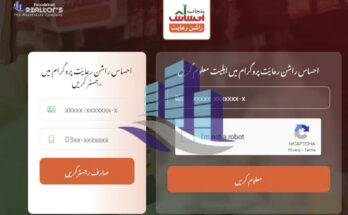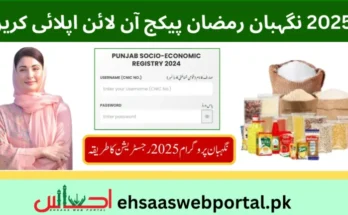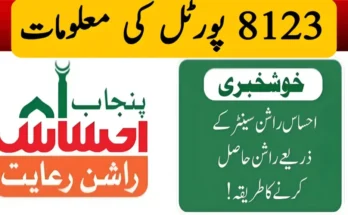The Ehsaas Rashan Program stands as a cornerstone of Pakistan’s social welfare initiatives, specifically designed to provide affordable essential food items to low-income families grappling with economic challenges. Launched in November 2021 by the Government of Pakistan, the program aims not only to combat food insecurity but also to alleviate the financial burden on vulnerable households. Moreover, by offering subsidies on staple foods such as flour, pulses, and cooking oil, the Ehsaas Rashan Program ensures that millions of families can access nutritious food at reduced costs.
In addition, its implementation reflects a commitment to social equity and economic resilience during times of inflation and hardship. As a result, the program has become an essential lifeline for many struggling communities. This article, therefore, explores the program’s objectives, eligibility criteria, registration process, and benefits. Furthermore, it highlights the transformative impact of the initiative on low-income communities across Pakistan, with a focus on SEO optimization to reach a broader audience searching for information on this vital support system.
What is the Ehsaas Rashan Program?
The Ehsaas Rashan Program, part of the broader Ehsaas initiative launched in 2019 by former Prime Minister Imran Khan, is a targeted subsidy program aimed at supporting low-income families in Pakistan. With inflation driving up the cost of essential commodities, the program provides a lifeline by offering a 30-40% subsidy on key food items, including flour, pulses (dal), cooking oil, ghee, and, in some cases, sugar and rice. The initiative targets approximately 20 million families, covering over 130 million individuals, making it one of the largest social welfare programs in Pakistan’s history.
The program operates through a digitally enabled system, collaborating with the National Bank of Pakistan (NBP) and utility stores to distribute subsidies via registered Kiryana (grocery) stores. Families earning below a certain income threshold, typically Rs. 50,000 per month, can register to receive discounts and, in some cases, cash assistance to meet their daily nutritional needs. The Ehsaas Rashan Program also includes special provisions during Ramadan, such as the Ramzan Relief Subsidy Muft Rashan Riayat Program, which provides free flour and additional discounts to ensure families can observe the holy month with dignity.
Objectives of the Ehsaas Rashan Program
The primary goal of the Ehsaas Rashan Program is to enhance food security for low-income households by making essential food items more affordable. Its key objectives include:
- Reducing Financial Strain: By offering subsidies of up to 40% on staple foods, the program alleviates the economic burden on families struggling with inflation.
- Promoting Nutritional Access: Ensures that vulnerable populations, including children, women, and the elderly, have access to nutritious food to combat malnutrition.
- Empowering Local Communities: Engages local Kiryana merchants by involving them in the subsidy distribution process, fostering economic inclusion and supporting small businesses.
- Enhancing Social Equity: Prioritizes marginalized groups such as widows, orphans, and people with disabilities, ensuring equitable access to resources.
- Leveraging Technology: Utilizes a digital platform, including the Ehsaas Rashan Portal and SMS services, to streamline registration and ensure transparency.
Eligibility Criteria for the Ehsaas Rashan Program
To ensure that the benefits reach those who need them most, the Ehsaas Rashan Program has clear eligibility criteria. Families and individuals must meet the following requirements:
- Income Threshold: Households with a monthly income of less than Rs. 50,000 are eligible, though this threshold may vary slightly by province or phase of the program.
- Household Size: Larger families with more members are prioritized to address greater financial needs.
- Vulnerable Groups: Special consideration is given to widows, orphans, people with disabilities, and other marginalized groups.
- Geographical Focus: While the program is nationwide, specific emphasis is placed on regions like Punjab, Khyber Pakhtunkhwa, Gilgit-Baltistan, and Azad Jammu and Kashmir.
- Registration Requirements: Applicants must provide a valid Computerized National Identity Card (CNIC) number and a mobile number registered in their name.
To check eligibility, families can send their CNIC number via SMS to 8171 or 8123, depending on the program phase, or visit the official Ehsaas Rashan Portal at ehsaasrashan.pass.gov.pk.
How to Register for the Ehsaas Rashan Program
The registration process for the Ehsaas Rashan Program is designed to be user-friendly and accessible, leveraging both online and offline methods to accommodate diverse populations. Here’s a step-by-step guide to registering:
- Online Registration:
- Visit the official Ehsaas Rashan Portal at ehsaasrashan.pass.gov.pk.
- Navigate to the registration section and enter your CNIC number and mobile number.
- Fill out the required personal and household details, including income and family size.
- Submit the form and note the application number for tracking purposes.
- Await a confirmation message, typically sent within a few days, indicating eligibility status.
- SMS Registration:
- Send your 14-digit CNIC number (without spaces or dashes) to 8171 or 8123, depending on the program’s phase.
- Receive a confirmation SMS with further instructions or eligibility status.
- In-Person Registration:
- Visit a nearby Ehsaas Registration Center or NADRA office to verify your CNIC.
- Submit verified documents at an Ehsaas Program Tehsil Office to complete the registration process.
- App-Based Registration:
- Download the Ehsaas Rashan Riayat app from the official website or app store.
- Register using your CNIC and track your application status in real-time.
Once registered, eligible families receive subsidies through designated Kiryana stores or utility stores, where merchants use a mobile Point of Sale (mPOS) app to verify eligibility and apply discounts.
Benefits of the Ehsaas Rashan Program
The Ehsaas Rashan Program offers a range of benefits that directly impact the lives of low-income families:
- Subsidized Food Items: Eligible households receive a 30-40% discount on essential commodities like flour, pulses, cooking oil, ghee, and, in some cases, sugar and rice. This translates to savings of up to Rs. 1,000-2,000 per month, depending on the program phase.
- Cash Assistance: Some iterations of the program, such as the Ehsaas Rashan 12000 Package, provide one-time cash aid of Rs. 12,000 to help families meet immediate needs.
- Free Flour Scheme: During Ramadan and other critical periods, the program distributes free flour to ensure families have access to staple foods.
- Support for Merchants: Kiryana store owners benefit from an 8% commission on subsidized transactions, encouraging their participation and boosting local economies.
- Digital Transparency: The use of a digital mPOS system and SMS services ensures transparency, reduces fraud, and enhances the efficiency of subsidy distribution.
Impact on Low-Income Families
The Ehsaas Rashan Program has had a profound impact on millions of Pakistani households. By addressing food insecurity, it has:
- Improved Nutritional Outcomes: Access to subsidized staples has helped reduce malnutrition, particularly among children and pregnant women.
- Empowered Women: Many beneficiaries are women who manage household finances, fostering greater financial independence and decision-making power.
- Strengthened Communities: The program’s inclusive approach has bridged socio-economic gaps, ensuring that marginalized groups receive targeted support.
- Mitigated Inflation Effects: With food prices rising, the subsidies have provided critical relief, enabling families to afford basic necessities without compromising other expenses.
For example, in Punjab, the Punjab Ehsaas Rashan Riayat Program has reached millions of families, with a budget of Rs. 100 billion allocated to provide edible items at a 40% discount. This initiative, inaugurated in 2022, has been praised for its accessibility and effectiveness in remote areas.
Challenges and Future Prospects
Despite its successes, the Ehsaas Rashan Program faces challenges, including:
- Registration Barriers: Limited internet access in rural areas can hinder online registration, though SMS and in-person options help mitigate this issue.
- Funding Sustainability: The program’s reliance on federal and provincial funding requires consistent budgetary support to maintain its scale.
- Program Continuity: Political changes have occasionally disrupted the program, as seen in 2022 when it was temporarily closed, affecting 20 million families.
Looking ahead, the program could expand its reach by:
- Increasing the number of subsidized items to include rice, tea, and other essentials.
- Enhancing digital infrastructure to improve access in remote regions.
- Integrating nutritional counseling to maximize the health benefits of subsidized foods.
Conclusion
The Ehsaas Rashan Program is a transformative initiative that addresses the pressing issue of food insecurity in Pakistan. By providing subsidies on essential food items, cash assistance, and free flour during critical times, it ensures that low-income families can access nutritious food without financial strain. Its user-friendly registration process, transparent digital systems, and focus on marginalized groups make it a model for social welfare programs globally. For families struggling with inflation, the Ehsaas Rashan Program is more than just a subsidy—it’s a beacon of hope, fostering resilience and dignity. To benefit from this program, eligible households are encouraged to register via the Ehsaas Rashan Portal or SMS to 8171/8123 and secure the support they need.



